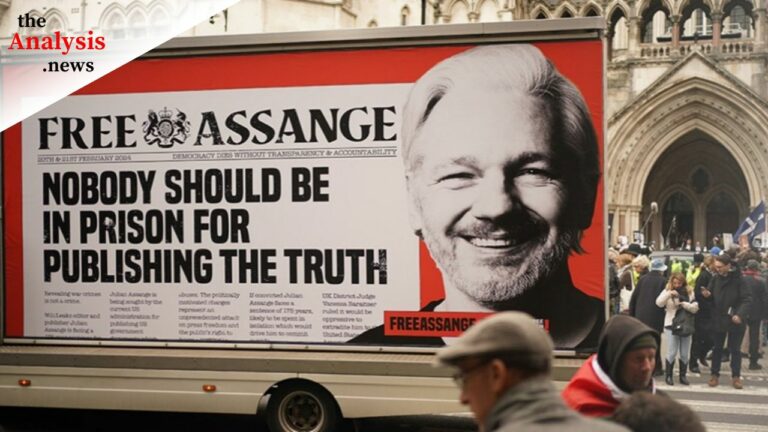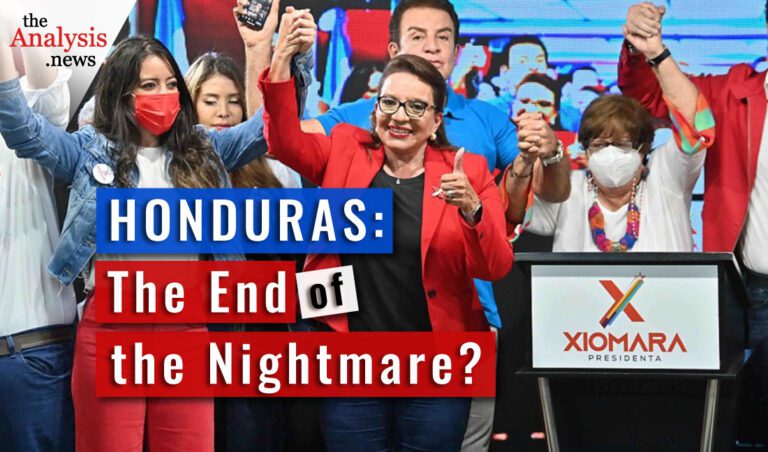This is an episode of Reality Asserts Itself, produced on January 20, 2017. On Reality Asserts Itself, Nina Turner, whose husband is a retired cop and son is active duty, tells host Paul Jay that police need to be held accountable, but so do policymakers who are responsible for stagnant wages and chronic poverty.
PAUL JAY: Welcome back to Reality Asserts Itself. I’m Paul Jay on the Real News Network. We’re continuing our discussion with former Ohio State Senator, Nina Turner, who rose to national prominence as the, perhaps best-known surrogate, for Bernie Sanders. I always find that name ‘surrogate’ very odd. At any rate, Nina — you’ve got to watch the first several of the series of these interviews, because this will make a heck of a lot more sense, but I should also say, which I may have forgotten to say in a couple of these introductions, that Nina is going to be doing a show with The Real News Network and I should sort of make that transparent. Thanks for joining us.
NINA TURNER: Good to be here.
PAUL JAY: You’re married to a retired police officer.
NINA TURNER: I am.
PAUL JAY: Your son is a police officer in Cleveland.
NINA TURNER: He is.
PAUL JAY: You are representing two things: one, you’re representing a politics of taking on the oligarchy, taking on finance, taking on the billionaire class, as Bernie said and you said.
NINA TURNER: Yeah.
PAUL JAY: In most communities police are considered the defenders of those things. You’re also — in a moment — and I know you’ve been outspoken about this, but with Black Lives Matter and the number of killings of unarmed black people, particularly young black men, systemic racism, and police are seen as, again, a defender of that, in cities like Cleveland and Baltimore.
NINA TURNER: Yes.
PAUL JAY: How do you balance this, that you know, you’re a police officer family, sort of.
NINA TURNER: Yeah.
PAUL JAY: On the other hand, you see the problem.
NINA TURNER: You balance it carefully, but truthfully. And it’s hard, you know, I do get it. I worried about my husband coming home safe many a night. I worry about my son right now, you know, being in law enforcement. Every single day I want to hear his voice, I want to hug him, I want to see him, but he is the type of officer, just in the same way my husband was, that you want to be on the force, because they can cross-pollinate communities and they get it. They understand, and not that you have to be African-American or of color to get it, but the likelihood that you get it really does matter. So, it’s hard, but it is also true that the black community wants what the white community, or any other community wants, they want transparency and they want justice and they want accountability. And you can have both, but unfortunately, you know, what happened here in Baltimore with Freddie Gray, or what happened in Cleveland with Tamara Rice, or further down the road in Ohio with John Crawford III, you know, Sandra Bland. I mean, you name it — there is a tension that is brewing in this country over policing in America. And I often say, that all police officers are not bad. The overall majority of them do a great job. But we do need to recalibrate this relationship and have an honest conversation about what it means to police communities of color and whether or not the system itself, not just with police officers, but let’s look at prosecutors, let’s look at judges, let’s look at a system where we have almost 2.5 million people in prison and almost a million of those people are African-Americans and particularly African-American males, and whether that is just. So, this is a broader-based conversation, but I get it on both sides. I do understand; my husband has been racially profiled. My son not as much, but he has, you know, endured some of that, but yet he wears that badge and a gun, and he reminds me, “Mom, I don’t wear my bullet-proof vest to make a fashion statement, where it’s real that police officers can be on a routine traffic stop and be killed.” So, all of this is real, but it is also real that there is some over-policing in the African-American community to the extent that African-Americans are treated differently. There was a study that shows that white people see black children, particularly black males, as older than they really, really are. Some implicit biases are there. And how do we deal with that as a community, knowing the community needs the police, but the police also need the community?
PAUL JAY: We’ve been talking about this a lot on The Real News, you know, we’re in Baltimore.
NINA TURNER: Yeah.
PAUL JAY: It’s certainly one of the most urgent issues here. One of the ways we’ve been framing it is, police are called law enforcement officers.
NINA TURNER: Uh huh.
PAUL JAY: And I’ve always thought that’s all they should be called. Because the reason there is a problem with policing, is because there’s a problem with the law.
NINA TURNER Uh huh.
PAUL JAY: The law itself is the thing that’s inherently biased.
NINA TURNER: Yes.
PAUL JAY: It’s the law that reinforces a whole set of social conditions.
NINA TURNER: That’s right.
PAUL JAY: That you have such chronic poverty for 60 years in Baltimore.
NINA TURNER: Uh huh.
PAUL JAY: Someone used to work here whose father was a cop, and I talked with him about all this and he said, “You know, as a society you guys you have to decide. Do you want us to be the hammer? Or you want us to hand out flowers?”
NINA TURNER: Uh huh.
PAUL JAY: And essentially, you know, what he was saying was if you have this enormous poverty, which we know it’s the deep poverty that breeds the violence, you want us… you know, you’re asking us to be hammers.
NINA TURNER: Uh huh.
PAUL JAY: Because you know this poverty, if it isn’t contained, especially, you know, geographically contained in poor neighborhoods and, you know, there’s wealthy neighborhoods here like Roland Park, you know, or Federal Hill, they don’t want the crime to spill out.
NINA TURNER: Uh huh.
PAUL JAY: As long as it is poor black people killing poor black people, and that’s contained, then that’s really what you’re asking the police to do.
NINA TURNER: Right. Police respond to symptoms. I’ll never forget, I had a police chief say that exactly, almost in the same way you’re framing your conversation. Police respond to crisis within communities that they didn’t create, but at the same time, when the entry into your dance, if you will, with the system itself — on the criminal side, police are the first, or sheriffs, you know, the law enforcement agency. We do have to deal with the fact of whether or not there are some biases within that system even beyond… Poverty is not a crime. To be poor is not a crime. But the system treats it that way and the symptoms that come out of that. So, we’re asking police to be something different than everybody else. We are all socialized, whether we’re black, white, Hispanic, Asian, Native American and anybody else I forgot, because this is real about naming, you know, the different categories. But we’re all socialized by a system that says that black men and women, or men and women of color by extension, certain groups, are more criminal than anybody else. That’s real. And so it’s not just the police who come out of that belief — it’s all of us. And so, we have to deconstruct our construction. So, we have to create a fairer and a more just criminal justice system. The police are one part of that system and often times they’re the symbolic part of that system. It’s what we see.
PAUL JAY: The face of it.
NINA TURNER: That’s it. That’s what we see. So, yes, the pressure and the burden is on them, but this is a systemic crisis that we have to deal with.
PAUL JAY: Isn’t part of the responsibility also the emergence in cities like Baltimore, but Cleveland and others, the emergence of this black political class who runs City Hall, is the Mayor…
NINA TURNER: Uh huh.
PAUL JAY: But continues to pursue economic policies…
NINA TURNER: Yes.
PAUL JAY: …that favor developers and does nothing to deal with the profound unemployment in these areas. You know, we were at dinner last night with Eddie Conway, and he was talking about how he’s talking to people who are, you know, dealing drugs in the area around Gilmor Homes, where Freddie Gray grew up. They don’t even make minimum wage on the corners. It’s not like this is some preferred occupation ’cause they’re making so much money, they would far rather have real jobs and not have to worry about getting killed by someone competing for the corner…
NINA TURNER: Right.
PAUL JAY: Or worry about the cops coming to arrest them. But this political class, that kind of operates in the service of mostly white finance banks, developers, does so little to deal with the question of unemployment. It’s almost taken like a given. It’s like, “Oh, yeah, there’s going to be this massive unemployment and that’s the way it is.”
NINA TURNER: And underemployment too, Paul.
PAUL JAY: Yeah, low wage employment, yeah.
NINA TURNER: Yeah. I mean, Americans have not seen their real wages go up in this country for quite some time. There is a pro… People don’t get up for decent. People get up for good and great. And what are we doing? I mean one of the failings of the Democratic Party, I think, and we talked about this, too, is we’re so good, we’re so great, unemployment is down. And you know, cheering us on. Well, that’s true, but it is also true that people’s quality of life, for that same… have to work two and three jobs to make ends meet. When a generation ago, maybe it was only one and a half jobs. And so, our failure to really dig down and empathize with, and then create policies that help and admit and confess, that for the vast majority of Americans in this country, their quality of life has diminished. And so, now if I have to work two and three jobs, where I only had to work a job and a half, and I have children. Who’s spending time with my children? Who’s raising my children? When do I get a break as a human being? As a thinking, feeling human being, so I can recharge my batteries and be a better thinking, feeling human being? All of these things are connected. So, you’re absolutely right, the policies that are in place — and so we have to both hold our police officers accountable, but we also have to give them the tools that they need. Now, my husband will argue that this is bigger than training, ’cause he would say to me, “Baby, I was in some of those same training… and I never picked up, you know, just started shooting people.” So, some of it though is really about what type of nation we want to be, and is it going to be fair and just.
PAUL JAY: What do you think the Trump Presidency is going to mean for police culture? The Republican Convention was about law and order.
NINA TURNER: Law and order, in my city. It was in Cleveland. You can’t have…
PAUL JAY: Sheriff David Clarke from… spoke there.
NINA TURNER: African-American… I mean, you can’t have law and order…
PAUL JAY: Basically calling for the criminalization of Black Lives Matter, and blaming them for the assassination of police officers.
NINA TURNER: It just continues to pour salt on a wound that we have to… We have to solve this, Paul Jay. We don’t live in a perfect society, i.e., we need law enforcement for a reason, as my son said about the bulletproof vest. So, the community need the police, and the police need the community. Most crimes are solved not because police officers or law enforcement roll by and saw the crime. It’s solved because citizens get involved. They get a tip. They are engaged. So, we need both. But for President-elect and I hope he softens his stance, you can’t have law and order without–
PAUL JAY: Jeff Sessions as Attorney General doesn’t sound real soft–
NINA TURNER: It doesn’t but you can’t have… I want to try… Listen, I hope the President-elect does the right thing. You can’t have law and order without trust. You can’t have law and order without accountability and transparency and respect.
PAUL JAY: But you can’t have law… but you can’t have–
NINA TURNER: You can’t!
PAUL JAY: But you can’t have respect and law and order if the foundation of it is reinforce conditions of chronic poverty.
NINA TURNER: Right!
PAUL JAY: And low wages and…
NINA TURNER: Yeah.
PAUL JAY: And you know, President Obama going… in the run up to the election, him taking so much credit for this achievement, that achievement, lower unemployment… We know one of the reasons for lower unemployment is the lower participation rate. People just give up looking for work.
NINA TURNER: Right.
PAUL JAY: Or they’re accepting jobs at wages far below what they’re training and…
NINA TURNER: Yes. Or they’re working more jobs to make that same.
PAUL JAY: Working more jobs.
NINA TURNER: Absolutely.
PAUL JAY: I mean, if you don’t deal with the economic roots of the crime…
NINA TURNER: You’ve got to.
PAUL JAY: …there’s not going to be any trust with the police.
NINA TURNER: We’ve got to get there. We need policy makers, not just President-elect Trump, ’cause a lot of this stuff happened before he ran. So, again it’s convenient for Democrats and other people to just totally lay this — all of these realities, the fact that Flint, you know, has lead in the water, failure of government — before Trump. The fact that wages are stagnant, failure in this country before President-elect Trump — so, let’s be real about these problems and how we are going to solve them and hold everybody accountable who deserves to be held accountable. So, Mr. Trump, President-elect Trump, will be and should be, held accountable for any policies that diminish, because he ran saying, “I’m gonna make America great again, and one of the ways I’m gonna do it is I’m gonna fight and look out for you.” There was that populist message.
PAUL JAY: But the appointments, it’s pretty clear…
NINA TURNER: Oh Lord!
PAUL JAY: This is Draconian–
NINA TURNER: Yeah.
PAUL JAY: State power. This is–
NINA TURNER: Antithesis of all that he…
PAUL JAY: Yeah, people like Sessions, as the Attorney General…
NINA TURNER: Yeah.
PAUL JAY: …you’re not going to… The DOJ Report on Baltimore, it was scathing in its critique of the police department, and said over and over again the police are denying people Constitutional Rights.
NINA TURNER: Same thing in Cleveland.
PAUL JAY: And breaking Federal law — now the recommendations, I think, were pretty milquetoast.
NINA TURNER: Uh huh.
PAUL JAY: More data collection, and…
NINA TURNER: Same thing in Cleveland.
PAUL JAY: …training and so on. But you’re not even going to see a critique like that from the DOJ with Sessions.
NINA TURNER: You’re right.
PAUL JAY: This is going to be a message to police forces across the country, “Go get ’em, cowboy.”
NINA TURNER: Uh huh, and we can’t sustain that ’cause we’re in a very fragile state when it comes to race right now. Because what we have been reminded of in this country, is that racism and discrimination is in our DNA, and we can’t face that. So, that’s why we want to have a boogieman or a boogie-woman but this… No, this is how the country was founded. And the whole notion of forming a more perfect union means that generation after generation — and what makes what President-elect Trump will do and can do, either to make this better or worse, is that one thing that we can say about our nation, we didn’t start off right in terms of equality and justice. But we have been a nation of progress and we can’t go backwards in 2016 [sic].
PAUL JAY: In terms of people becoming more conscious, being better able to fight for their own interests, in terms of people getting organized, do not black politicians, black leadership have to be more, and I would say, honest about the Obama Presidency? It’s eight years of President Obama’s Administration that helped create the conditions for a Trump victory.
NINA TURNER: We have to have the courage to critique that we can both love, respect, uplift and defend the black President when necessary, because let’s face it, Senator McConnell said that that was their ultimate goal — was to make President Obama a one-term president. It wasn’t for infrastructure. It wasn’t for education. It wasn’t for the uplift of the people in this country. Their sole goal was politics and who cares if people lose? “Everyday Americans lose, in the course of my politics. I just want the power.” That’s exactly what he said, and that is one of the reasons why the African-American community and other folks who supported President Obama kind of said, “Oh no, we gonna make sure.” In all of that extremism from the Republicans, there was a failure by Democratic leadership, but particularly the African-American community, and you know the pride that was felt to say that I can both love and support the President, but also critique him. And we cannot let that happen again.
PAUL JAY: Okay, this is just the beginning of the conversation. As I said, we’re going to be doing a show with Nina and interviewing her, I think, probably at least once a week. So, this is just the beginning of a conversation.
NINA TURNER: Just the beginning. Yeah, I’m looking forward to it.
PAUL JAY: Thanks very much for joining us.
NINA TURNER: Yeah, my pleasure.
PAUL JAY: And thank you for joining us on Reality Asserts Itself, on The Real News Network.
Never miss another story
Subscribe to theAnalysis.news – Newsletter
“Nina Turner is an American politician and television personality. A member of the Democratic Party, she was a Cleveland City Council member from 2006 to 2008 and a member of the Ohio Senate from 2008 until 2014. Turner was the Democratic nominee for Ohio Secretary of State in 2014 but lost in the general election against incumbent Jon Husted, receiving 35.5 percent of the vote. Her politics have been variously described as progressive, left-wing, or far-left.”










